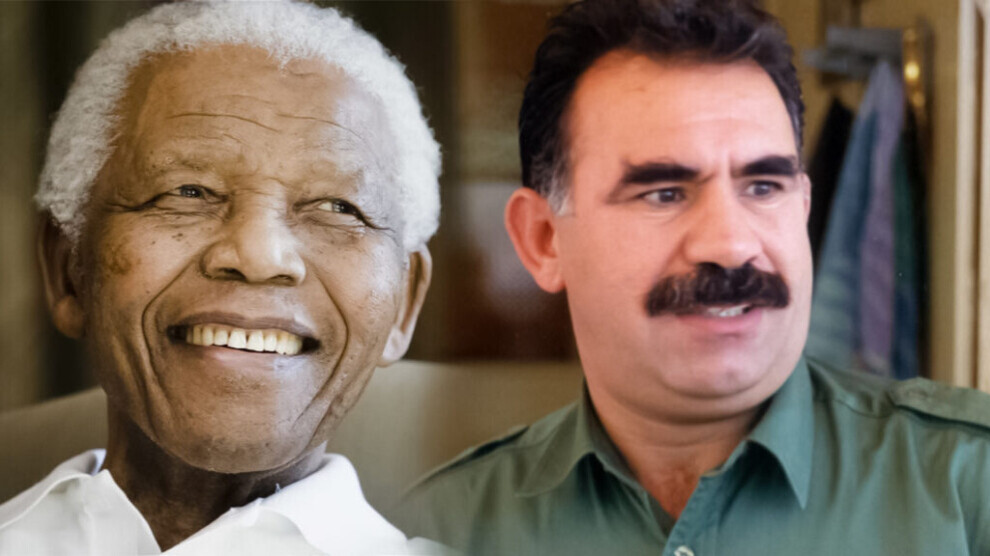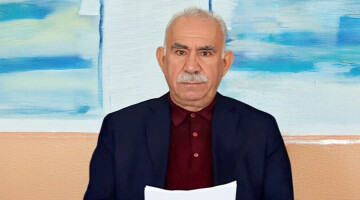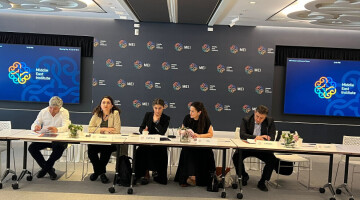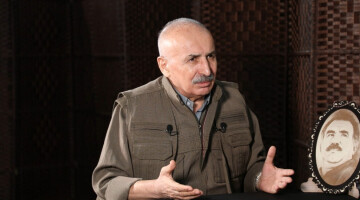After 43 months without any news from Abdullah Öcalan, the Kurdish leader met face to face with his nephew Ömer Öcalan on 23 October 2024. During the meeting, he stated that, “Isolation continues. If conditions are right, I have the theoretical and practical power to move this process from a ground of conflict and violence to a legal and political ground.”
Abdullah Öcalan's message brought the issue of legal grounds to the agenda once again. Speaking to ANF, lawyer Ercan Kanar stated that isolation and the ‘Right to Hope’ should not be a matter of negotiation, that isolation is already against the Mandela Rules as a form of torture, while the Right to Hope is now recognised as one of the most fundamental human rights.
Noting that the Right to Hope for freedom has not been discussed much publicly until today, Kanar pointed out that the right to hope for freedom, both in terms of isolation and the right to life, has been recognised as a fundamental human right for the last 75 years.
Kanar explained that the Right to Hope, in technical terms from the point of view of criminal law, is to hope for the right to conditional release: “This means that the right to life of every human being is important and that no matter what penalty the person has received or what his offence is, he should have the right to regain his freedom one day. In other words, when the conditions are appropriate, even in the event that a person has received the heaviest sentence, that sentence should be reviewed, and that person should be released when necessary.”
‘The Right to Hope is closely related to human dignity and value’
Kanar stated that the Right to Hope was put on the agenda in both the German Constitutional Court and the Italian Constitutional Court, as well as in several judgements by the European Court of Human Rights (ECtHR). The lawyer pointed out that this right is closely related to human dignity and value and should be popularised and legalized. Stating that the Right to Hope is applied in many countries, Kanar said, “In countries such as Norway, Spain, Portugal, Serbia, Bosnia and Herzegovina, even life imprisonment was abolished years ago, let alone aggravated life imprisonment. Portugal abolished life imprisonment in the 18th century. Currently, there is no other country in Europe, apart from Turkey, that imposes aggravated life imprisonment and has the relevant legislation. But there are European countries that apply normal life imprisonment. However, there is no normal life imprisonment in the European countries I have mentioned.”
‘The heavy isolation imposed on Öcalan violates the UN’s Mandela Rules’
Kanar noted that the MHP (Nationalist Movement Party) leader Devlet Bahçeli acknowledged the isolation in İmralı and President Recep Tayyip Erdoğan supported his remarks. “The government, which claimed that there was no such isolation just two weeks ago in response to the questions of the Parliamentary Committee of the Council of Europe, has thus refuted itself. Bahçeli's said, ‘Let Öcalan come and speak at the DEM group meeting in the Turkish Grand National Assembly and shout that terrorism is completely over and the organisation has been disbanded.’ He called for legal arrangements to be made regarding the use of the Right to Hope and the way to benefit from it to be opened wide open. The isolation should be lifted, and conditional release should be included in the law anyway, without such a condition being put forward. The harsh isolation conditions imposed on Öcalan are already in violation of the Mandela Rules. The United Nations (UN) Minimum Standard Rules on prisoners were revised in 2015 and renamed the Mandela Rules. They were named after Mandela because he fought so hard against isolation in prison and according to these rules, long-term solitary confinement and isolation can never be applied. In addition, the person concerned must be kept in a prison close to his family's home. He must also be allowed to read all legal publications. Family and lawyer visits cannot be prevented even under the most severe disciplinary penalty.”
‘Committee of Ministers warned Turkey again about the Right to Hope’
Referring to the approach of the Council of Europe’s Committee of Ministers and the ECtHR on long-term imprisonment, Kanar said: “According to the Committee of Ministers, sentences should be reviewed every 8 to 14 years and, according to the ECtHR, every 25 years. The ECtHR has already stated in many judgements that life imprisonment is torture, inhuman treatment and a violation of Article 3 of the European Convention on Human Rights. At its most recent meeting in September, the Committee of Ministers warned Turkey again about the Right to Hope and told the secretariat to draft an interim resolution if it did not take steps on this issue within the next year.”
‘The lack of the Right to Hope is torture according to the ECtHR’
Kanar pointed out that there are several ECtHR judgements on the Right to Hope, not only in the case of Abdullah Öcalan, and listed these judgements covering Turkey and other countries as follows: “Kurt v. Turkey judgement, Çiçek v. Turkey judgement, Taş v. Turkey judgement, Akdeniz v. Turkey judgement, Tanış and Others v. Turkey judgements. In other countries, there is the judgement of Winter v. The United Kingdom, the Kafkaris v. Cyprus, the Harkins and Edwards v. The United Kingdom.” Kanar said that with these judgements, the ECtHR recognised the lack of the right to conditional release, called the Right to Hope, as torture and considered it a violation of the prohibition of torture and ill-treatment. He underlined that Turkey should make a legal arrangement for the Right to Hope as soon as possible.
‘Life imprisonment should be removed from the legislation’
Kanar emphasised that in order for this arrangement to be made, the penalty of aggravated life imprisonment should be abolished first. He noted that this penalty was brought to the agenda with the abolition of the death penalty after Abdullah Öcalan was brought to Turkey. He stated that the execution of the aggravated imprisonment sentence was normally 30 years, but after Abdullah Öcalan was brought in, the regulation of imprisonment until death was made.
“At the moment, it is not only Öcalan who is in this situation. At least 10 people are currently sentenced to life imprisonment. If they have been sentenced to aggravated life imprisonment for political reasons, they are sentenced to heavy imprisonment until death. This is already against the purpose of the law on execution of sentences because this law theoretically aims to better, reintegrate and rehabilitate. However, when there is a sentence of life imprisonment, that is, when there is no hope of getting out, there is no betterment and rehabilitation. Then, on the contrary, execution becomes a second punishment. In this respect, life imprisonment should be removed from the legislation. Moreover, as a jurist, I am in favour of abolishing not only the aggravated life sentence, but also the normal life sentence. In other words, there should be no such punishment as a life sentence. As in Norway, Portugal, Spain, Serbia, Bosnia and Herzegovina, there should never be life imprisonment in criminal legislation. For this reason, concrete steps should be taken, not in words, and the provision of aggravated life imprisonment in the Turkish Penal Code (TCK) and the Anti-Terror Law (TMK) should be completely abolished.”
‘Öcalan's isolation process is similar to that of Nelson Mandela’
Stating that an example of this was experienced in South Africa, Kanar said that Abdullah Öcalan's isolation process was similar to that of Nelson Mandela: “The dictator of the time in South Africa wanted to meet with Mandela when he was kept under very severe isolation conditions. Nelson Mandela refused at first. But they eventually met due to the insistence of many circles. Then Nelson Mandela's isolation was lifted. A house was built for him near the prison. He stayed in that house. His family, journalists and various delegations were allowed to meet with him. I mean, this process is a bit similar to that one. There, too, the dictator brought up the lifting of isolation. In that respect, I think Bahçeli's undertaking is not against the nature of the work. Peace is made between warring forces anyway. Now, if a step is taken in this situation, a legal arrangement should be made and Öcalan, like Mandela, should first be taken out of isolation and a suitable residence should be provided for him and then he should be released.”














